have sb. done等用法
- 格式:doc
- 大小:22.50 KB
- 文档页数:2
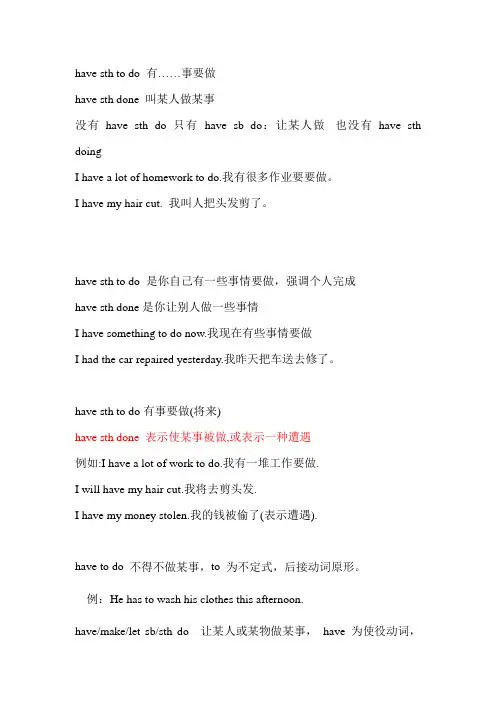
have sth to do 有……事要做have sth done 叫某人做某事没有have sth do 只有have sb do:让某人做 也没有have sth doingI have a lot of homework to do.我有很多作业要要做。
I have my hair cut. 我叫人把头发剪了。
have sth to do 是你自己有一些事情要做,强调个人完成have sth done是你让别人做一些事情I have something to do now.我现在有些事情要做I had the car repaired yesterday.我昨天把车送去修了。
have sth to do有事要做(将来)have sth done 表示使某事被做,或表示一种遭遇例如:I have a lot of work to do.我有一堆工作要做.I will have my hair cut.我将去剪头发.I have my money stolen.我的钱被偷了(表示遭遇).have to do 不得不做某事,to 为不定式,后接动词原形。
例:He has to wash his clothes this afternoon.have/make/let sb/sth do 让某人或某物做某事,have 为使役动词,后接动词原形。
例:Our teacher often has/makes/lets us do much homework.They always have the monkeys play with balls.注意:在被动语态中,要改为to do 形式。
例:He is often made to cook supper.have sth done 请或让某人(别人)做某事例:The king had his tomb built .I have already had my TV set repaired .至于have sth to do,英语中没有这种用法。
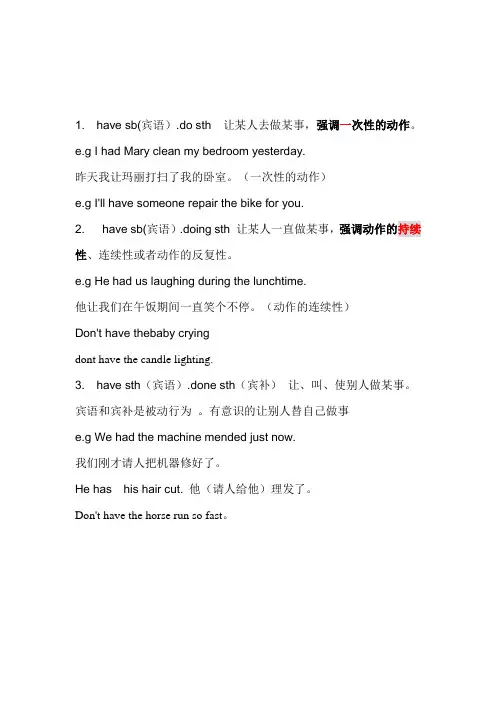
1. have sb(宾语).do sth 让某人去做某事,强调一次性的动作。
e.g I had Mary clean my bedroom yesterday.
昨天我让玛丽打扫了我的卧室。
(一次性的动作)
e.g I'll have someone repair the bike for you.
2. have sb(宾语).doing sth 让某人一直做某事,强调动作的持续性、连续性或者动作的反复性。
e.g He had us laughing during the lunchtime.
他让我们在午饭期间一直笑个不停。
(动作的连续性)
Don't have thebaby crying
dont have the candle lighting.
3. have sth(宾语).done sth(宾补)让、叫、使别人做某事。
宾语和宾补是被动行为。
有意识的让别人替自己做事
e.g We had the machine mended just now.
我们刚才请人把机器修好了。
He has his hair cut. 他(请人给他)理发了。
Don't have the horse run so fast。
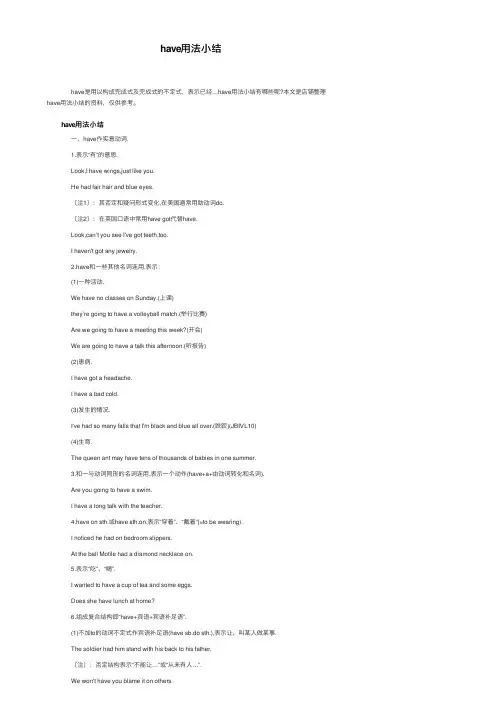
have⽤法⼩结 have是⽤以构成完成式及完成式的不定式,表⽰已经…have⽤法⼩结有哪些呢?本⽂是店铺整理have⽤法⼩结的资料,仅供参考。
have⽤法⼩结 ⼀、have作实意动词. 1.表⽰“有”的意思. Look,I have wings,just like you. He had fair hair and blue eyes. 〔注1〕:其否定和疑问形式变化,在美国通常⽤助动词do. 〔注2〕:在英国⼝语中常⽤have got代替have. Look,can’t you see I've got teeth,too. I haven't got any jewelry. 2.have和⼀些其他名词连⽤,表⽰: (1)⼀种活动. We have no classes on Sunday.(上课) they’re going to have a volleyball match.(举⾏⽐赛) Are we going to have a meeting this week?(开会) We are going to have a talk this afternoon.(听报告) (2)患病. I have got a headache. I have a bad cold. (3)发⽣的情况. I've had so many falls that I'm black and blue all over.(跌跤)(JBⅣL10) (4)⽣育. The queen ant may have tens of thousands of babies in one summer. 3.和⼀与动词同形的名词连⽤,表⽰⼀个动作(have+a+由动词转化和名词). Are you going to have a swim. I have a long talk with the teacher. 4.have on sth.或have sth.on,表⽰“穿着”、“戴着”(=to be wearing). I noticed he had on bedroom slippers. At the ball Motile had a diamond necklace on. 5.表⽰“吃”、“喝”. I wanted to have a cup of tea and some eggs. Does she have lunch at home? 6.组成复合结构即“have+宾语+宾语补⾜语”. (1)不加to的动词不定式作宾语补⾜语(have sb.do sth.),表⽰让、叫某⼈做某事. The soldier had him stand with his back to his father. 〔注〕:否定结构表⽰“不能让…”或“从未有⼈…”. We won't have you blame it on others. She had never had anybody speak to her that way before. (2)现在分词作宾语补⾜语(have sb.(sth.)doing),表⽰让(使)某⼈做某事. …the two men had their lights burning all night long…. (3)过去分词作宾语补⾜语(have sb.(sth.)done),表⽰: ①使(让,请)别⼈作某事,表⽰的动作是别⼈做的. Emperor Qin Shi Huang had all the walls joined up. …he should have new clothes made of this splendid cloth for the coming great procession. ②遭遇到某事. Houses near airports sometimes have their windows broken. Workers in some industries have their hearing harmed by the noise of the machine. ⼆、have与to⼀起构成情态动词,表⽰“不得不”、“必 须”,可⽤于各种时态. I have to look after her at home. 三、have做助动词与动词的过去分词⼀起构成现在完成时 和过去完成时. Great changes have taken place the last two years. They said that the Arab had stolen their camel. 四、have⽤于“情态动词+have+过去分词”的结构,有推测、假设之意. 1.must+have+过去分词,表⽰对过去时间发⽣的动作或存在的情况的推测,⼀般⽤于肯定句. Her father thought that she must have met a fairy. You must have left your bag in the theatre. 2.can(could)+have+过去分词,表⽰对过去发⽣事情的“不肯定”,常⽤于否定句和疑问句. He can't have been to your home,he doesn't know your address. 3.should+have+过去分词,表⽰“某事本该早做⽽实际未做”,⽤于肯定句. You should have been here five minutes ago. 五、have⽤于某些成语,表⽰固定的意思. 1.have a word(a few words)with sb.,表⽰和某⼈说⼀(⼏)句话. Where's Peter?I want to have a word with him. 2.had better+不带to的动词不定式,表⽰“…最好…”. I'd better go and look for him now. 3.have nothing(something)to do with,表⽰“和…⽆(有)”关系. Most of questions had nothing to do with Edison's lessons. 动词have的⽤法 动词have在中学英语中的⽤法 ⼀、have作实意动词。
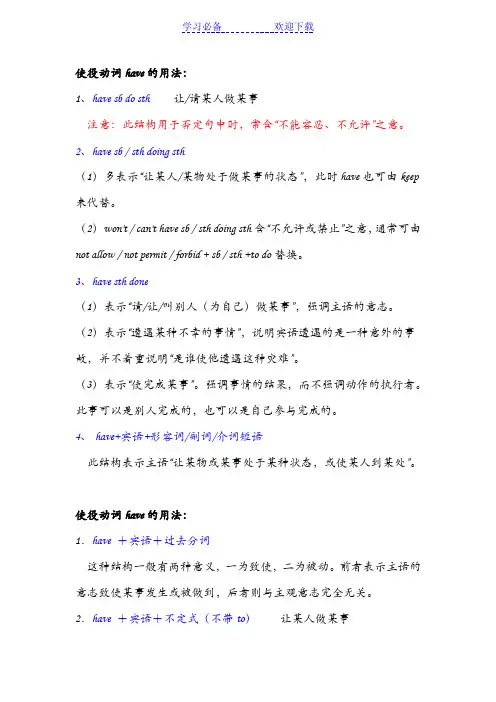
使役动词have的用法:
1、have sb do sth 让/请某人做某事
注意:此结构用于否定句中时,常含“不能容忍、不允许”之意。
2、have sb / sth doing sth
(1)多表示“让某人/某物处于做某事的状态”,此时have也可由keep 来代替。
(2)won't / can't have sb / sth doing sth含“不允许或禁止”之意,通常可由not allow / not permit / forbid + sb / sth +to do替换。
3、have sth done
(1)表示“请/让/叫别人(为自己)做某事”,强调主语的意志。
(2)表示“遭遇某种不幸的事情”,说明宾语遭遇的是一种意外的事故,并不着重说明“是谁使他遭遇这种灾难”。
(3)表示“使完成某事”。
强调事情的结果,而不强调动作的执行者。
此事可以是别人完成的,也可以是自己参与完成的。
4、have+宾语+形容词/副词/介词短语
此结构表示主语“让某物或某事处于某种状态,或使某人到某处”。
使役动词have的用法:
1.have +宾语+过去分词
这种结构一般有两种意义,一为致使,二为被动。
前者表示主语的意志致使某事发生或被做到,后者则与主观意志完全无关。
2.have +宾语+不定式(不带to)让某人做某事
3.have +宾语+现在分词
这种结构有两种意思,一是使某人做某事,二是与否定词连用,表示不许某人做某事。
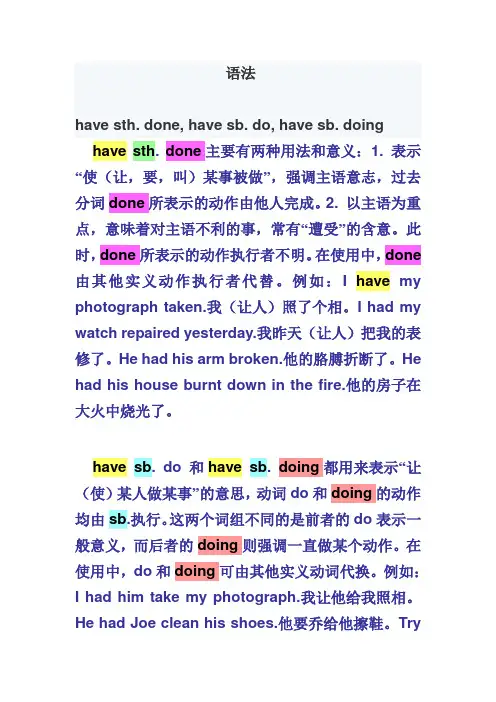
语法
have sth. done, have sb. do, have sb. doing have sth. done主要有两种用法和意义:1. 表示“使(让,要,叫)某事被做”,强调主语意志,过去分词done所表示的动作由他人完成。
2. 以主语为重点,意味着对主语不利的事,常有“遭受”的含意。
此时,done所表示的动作执行者不明。
在使用中,done 由其他实义动作执行者代替。
例如:I have my photograph taken.我(让人)照了个相。
I had my watch repaired yesterday.我昨天(让人)把我的表修了。
He had his arm broken.他的胳膊折断了。
He had his house burnt down in the fire.他的房子在大火中烧光了。
have sb. do 和have sb. doing都用来表示“让(使)某人做某事”的意思,动词do和doing的动作均由sb.执行。
这两个词组不同的是前者的do表示一般意义,而后者的doing则强调一直做某个动作。
在使用中,do和doing可由其他实义动词代换。
例如:I had him take my photograph.我让他给我照相。
He had Joe clean his shoes.他要乔给他擦鞋。
Try
to have her speaking!设法让她继续说话。
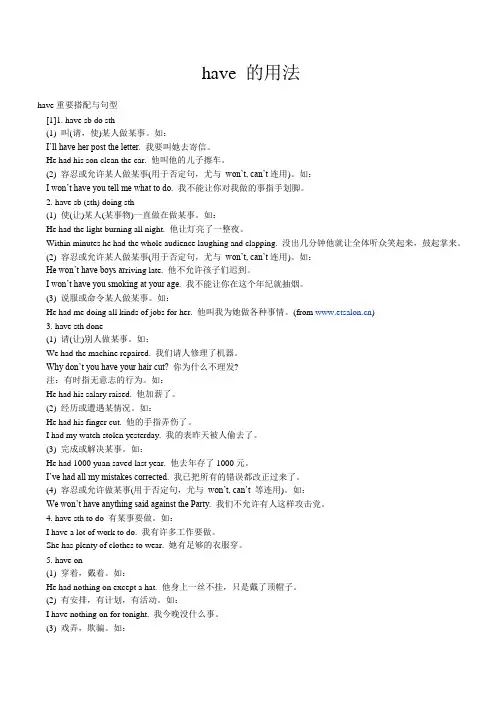
have 的用法have重要搭配与句型[1]1. have sb do sth(1) 叫(请,使)某人做某事。
如:I’ll have her post the letter. 我要叫她去寄信。
He had his son clean the car. 他叫他的儿子擦车。
(2) 容忍或允许某人做某事(用于否定句,尤与won’t, can’t连用)。
如:I won’t have you tell me what to do. 我不能让你对我做的事指手划脚。
2. have sb (sth) doing sth(1) 使(让)某人(某事物)一直做在做某事。
如:He had the light burning all night. 他让灯亮了一整夜。
Within minutes he had the whole audience laughing and clapping. 没出几分钟他就让全体听众笑起来,鼓起掌来。
(2) 容忍或允许某人做某事(用于否定句,尤与won’t, can’t连用)。
如:He won’t have boys ar riving late. 他不允许孩子们迟到。
I won’t have you smoking at your age. 我不能让你在这个年纪就抽烟。
(3) 说服或命令某人做某事。
如:He had me doing all kinds of jobs for her. 他叫我为她做各种事情。
(from )3. have sth done(1) 请(让)别人做某事。
如:We had the machine repaired. 我们请人修理了机器。
Why don’t you have your hair cut? 你为什么不理发?注:有时指无意志的行为。
如:He had his salary raised. 他加薪了。
(2) 经历或遭遇某情况。
如:He had his finger cut. 他的手指弄伤了。
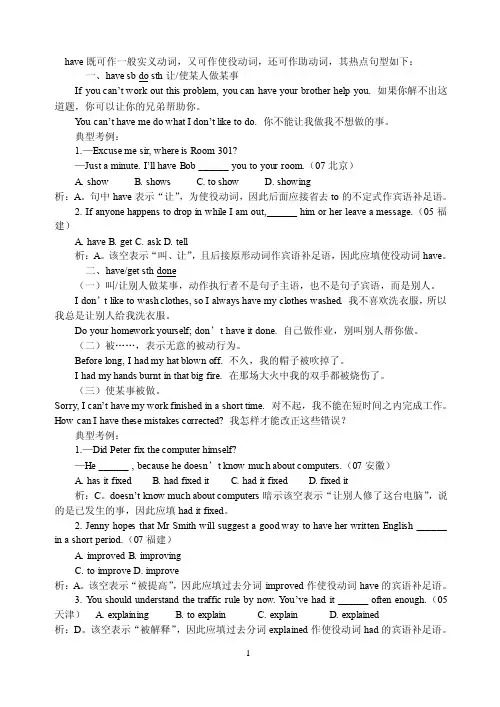
have既可作一般实义动词,又可作使役动词,还可作助动词,其热点句型如下:一、have sb do sth让/使某人做某事If you can’t work out this problem, you can have your brother help you. 如果你解不出这道题,你可以让你的兄弟帮助你。
Y ou can’t have me do what I don’t like to do. 你不能让我做我不想做的事。
典型考例:1.—Excuse me sir, where is Room 301?—Just a minute. I’ll have Bob ______ you to your room.(07北京)A. showB. showsC. to showD. showing析:A。
句中have表示“让”,为使役动词,因此后面应接省去to的不定式作宾语补足语。
2. If anyone happens to drop in while I am out,______ him or her leave a message.(05福建)A. haveB. getC. askD. tell析:A。
该空表示“叫、让”,且后接原形动词作宾语补足语,因此应填使役动词have。
二、have/get sth done(一)叫/让别人做某事,动作执行者不是句子主语,也不是句子宾语,而是别人。
I don’t like to wash clothes, so I always have my clothes washed. 我不喜欢洗衣服,所以我总是让别人给我洗衣服。
Do your homework yourself; don’t have it done. 自己做作业,别叫别人帮你做。
(二)被……,表示无意的被动行为。
Before long, I had my hat blown off. 不久,我的帽子被吹掉了。
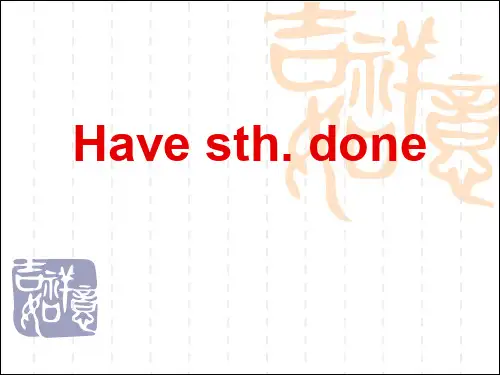
给大家推荐一个英语微信群-Empty Your Cup
英语微信群是目前学习英语最有效的方法,群里都是说英语,没有半个中文,而且规则非常严格,是一个超级不错的英语学习环境,群里有好多英语超好的超牛逼的人,还有鬼佬和外国美眉。
其实坦白说,如果自己一个人学习英语太孤独,太寂寞,没有办法坚持,好几次都会半途而废。
只要你加入到那个群里以后,自己就会每天都能在群里坚持学,坚持不停地说和练,由于是付费群,群里的成员学习氛围非常强,每天的训练度都非常猛,本来很懒惰的你一下子就被感染了,不由自主地被带动起来参与操练,不好意思偷懒,别人的刻苦学习精神会不知不觉影响你,Empty Your Cup英语微信群(进群加喂新 601332975)可以彻底治好你的拖延症,里面学员都非常友好,总是给你不断的帮助和鼓励,让你在学英语的路上重新燃起了斗志,因为每天都在运用,你的英语口语就能得到了迅猛的提升,现在可以随便给一个话题,都能用英文滔滔不绝的发表5分钟以上对这个话题的看法和观点,想提高英语口语的 可以加入进来,It really works very well.。
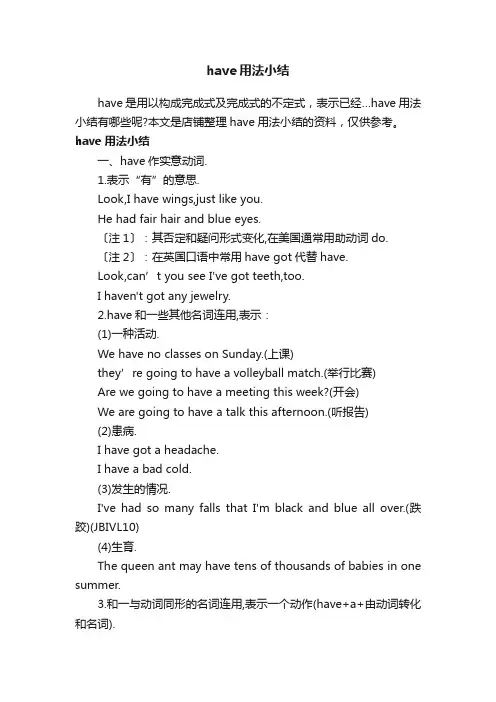
have用法小结have是用以构成完成式及完成式的不定式,表示已经…have用法小结有哪些呢?本文是店铺整理have用法小结的资料,仅供参考。
have用法小结一、have作实意动词.1.表示“有”的意思.Look,I have wings,just like you.He had fair hair and blue eyes.〔注1〕:其否定和疑问形式变化,在美国通常用助动词do.〔注2〕:在英国口语中常用have got代替have.Look,can’t you see I've got teeth,too.I haven't got any jewelry.2.have和一些其他名词连用,表示:(1)一种活动.We have no classes on Sunday.(上课)they’re going to have a volleyball match.(举行比赛)Are we going to have a meeting this week?(开会)We are going to have a talk this afternoon.(听报告)(2)患病.I have got a headache.I have a bad cold.(3)发生的情况.I've had so many falls that I'm black and blue all over.(跌跤)(JBⅣL10)(4)生育.The queen ant may have tens of thousands of babies in one summer.3.和一与动词同形的名词连用,表示一个动作(have+a+由动词转化和名词).Are you going to have a swim.I have a long talk with the teacher.4.have on sth.或have sth.on,表示“穿着”、“戴着”(=to be wearing).I noticed he had on bedroom slippers.At the ball Motile had a diamond necklace on.5.表示“吃”、“喝”.I wanted to have a cup of tea and some eggs.Does she have lunch at home?6.组成复合结构即“have+宾语+宾语补足语”.(1)不加to的动词不定式作宾语补足语(have sb.do sth.),表示让、叫某人做某事.The soldier had him stand with his back to his father.〔注〕:否定结构表示“不能让…”或“从未有人…”.We won't have you blame it on others.She had never had anybody speak to her that way before.(2)现在分词作宾语补足语(have sb.(sth.)doing),表示让(使)某人做某事.…the two men had their lights burning all night long….(3)过去分词作宾语补足语(have sb.(sth.)done),表示:①使(让,请)别人作某事,表示的动作是别人做的.Emperor Qin Shi Huang had all the walls joined up.…he should have new clothes made of this splendid cloth for the coming great procession.②遭遇到某事.Houses near airports sometimes have their windows broken.Workers in some industries have their hearing harmed by the noise of the machine.二、have与to一起构成情态动词,表示“不得不”、“必须”,可用于各种时态.I have to look after her at home.三、have做助动词与动词的过去分词一起构成现在完成时和过去完成时.Great changes have taken place the last two years.They said that the Arab had stolen their camel.四、have用于“情态动词+have+过去分词”的结构,有推测、假设之意.1.must+have+过去分词,表示对过去时间发生的动作或存在的情况的推测,一般用于肯定句.Her father thought that she must have met a fairy.You must have left your bag in the theatre.2.can(could)+have+过去分词,表示对过去发生事情的“不肯定”,常用于否定句和疑问句.He can't have been to your home,he doesn't know your address.3.should+have+过去分词,表示“某事本该早做而实际未做”,用于肯定句.You should have been here five minutes ago.五、have用于某些成语,表示固定的意思.1.have a word(a few words)with sb.,表示和某人说一(几)句话.Where's Peter?I want to have a word with him.2.had better+不带to的动词不定式,表示“…最好…”.I'd better go and look for him now.3.have nothing(something)to do with,表示“和…无(有)”关系.Most of questions had nothing to do with Edison's lessons. 动词have的用法动词have在中学英语中的用法一、have作实意动词。
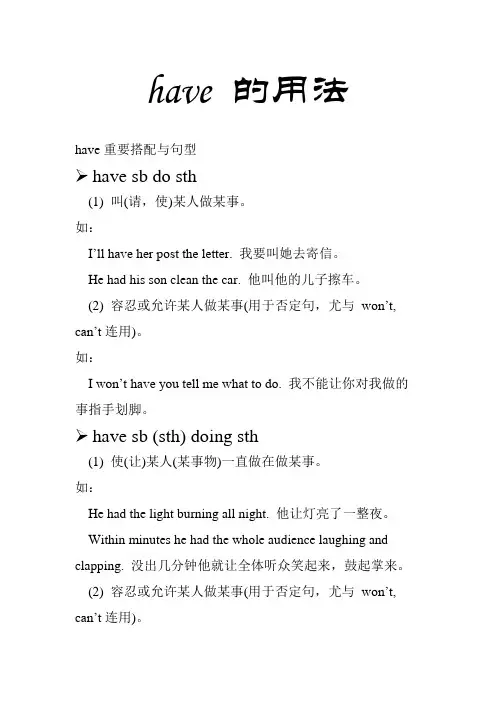
have 的用法have重要搭配与句型➢have sb do sth(1) 叫(请,使)某人做某事。
如:I’ll have her post the letter. 我要叫她去寄信。
He had his son clean the car. 他叫他的儿子擦车。
(2) 容忍或允许某人做某事(用于否定句,尤与won’t, can’t连用)。
如:I won’t have you tell me what to do. 我不能让你对我做的事指手划脚。
➢have sb (sth) doing sth(1) 使(让)某人(某事物)一直做在做某事。
如:He had the light burning all night. 他让灯亮了一整夜。
Within minutes he had the whole audience laughing and clapping. 没出几分钟他就让全体听众笑起来,鼓起掌来。
(2) 容忍或允许某人做某事(用于否定句,尤与won’t, can’t连用)。
如:He won’t have boys arriving late. 他不允许孩子们迟到。
I won’t have you smoking at your age. 我不能让你在这个年纪就抽烟。
(3) 说服或命令某人做某事。
如:He had me doing all kinds of jobs for her. 他叫我为她做各种事情。
➢have sth done(1) 请(让)别人做某事。
如:We had the machine repaired. 我们请人修理了机器。
Why don’t you have your hair cut? 你为什么不理发?注:有时指无意志的行为。
如:He had his salary raised. 他加薪了。
(2) 经历或遭遇某情况。
如:He had his finger cut. 他的手指弄伤了。
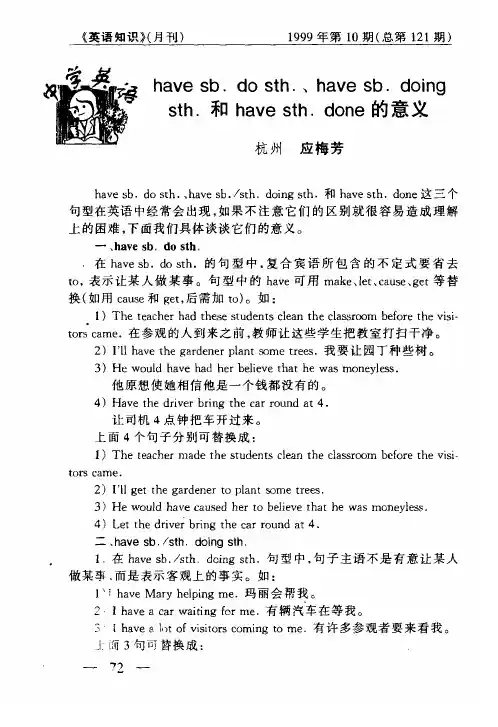
havesth.done等四种句型用法差异最全面总结have sth. done,have sb. do , have sb./sth. doing与have sth. to do 等四种句型的区别Thanks to: 许氏英语教学暨研究工作室一、Have sth. done可表示四种不同的语法意义(1)(主语)请/派别人完成某事。
例:①I had(=got) that door painted last week.上星期我请人把那扇门做了油漆。
②I had(=got) my teeth filled yesterday afternoon.昨天下午我请人补了牙。
(2)(主语)完成某事(可能参与)。
例:①they are going to have (=got) some threes planted.他们打算植些树。
②we must have (=got) the work finished by Tuesday.我们必须在星期二以前完成此项工作。
(3)(主语)遭受某种不幸的情况。
例:①I had my hat blown off.我的帽子被(风)吹掉了。
②I had my leg broken when I got off the bus.下车时我的腿子摔断了。
(4) 用于否定句中,表示“不允许….”“不让”。
例:①I won’t have anything said against her.我不会允许有任何反对她的言论。
②I won’t have my house turned into a hotel.不不会让我的房子变成一个旅馆。
二、have sb. do表示四种含意(1)(主语)请/派别人完成某事。
可以用“get sb. to do”结构来替换。
例:①I had him repair my bike. (=I got him to repair my bike.)我请他修理自行车。
②Don’t forget to have him come.别忘了叫他来。
have sth. done,have sb. do , have sb./sth. doing与have sth. to do等四种句型的区别一、Have sth. done可表示四种不同的语法意义(1)(主语)请/派别人完成某事。
例:① I had(=got) that door painted last week.上星期我请人把那扇门做了油漆。
② I had(=got) my teeth filled yesterday afternoon.昨天下午我请人补了牙。
(2)(主语)完成某事(可能参与)。
例:① they are going to have (=got) some threes planted.他们打算植些树。
② we must have (=got) the work finished by Tuesday.我们必须在星期二以前完成此项工作。
(3)(主语)遭受某种不幸的情况。
例:① I had my hat blown off.我的帽子被(风)吹掉了。
② I had my leg broken when I got off the bus.下车时我的腿子摔断了。
(4) 用于否定句中,表示“不允许….”“不让”。
例:① I won’t have anything said against her.我不会允许有任何反对她的言论。
② I won’t have my house turned into a hotel.不不会让我的房子变成一个旅馆。
二、have sb. do表示四种含意(1)(主语)请/派别人完成某事。
可以用“get sb. to do”结构来替换。
例:① I had him repair my bike. (=I got him to repair my bike.)我请他修理自行车。
② Don’t forget to have him come.别忘了叫他来。
(2)表示主语无意识的行为,这时“have”作“有”解。
浅谈关于have几个短语的句子结构have+宾语+宾语补足语(动词+宾语+宾语补足语),其宾语和宾语补足语有逻辑上的主谓关系。
have常用句型的句子结构分别如下:1、have sb. doing=keep sb. doing sb.是doing的施动者(即动作的执行者),是主动,表示动作的持续-I had him doing the work all night long.2、have sb. done 表示被动,让某人被做。
-You'd better find a doctor and have you checked over.3、have sb. do sth.使役动词,让某人做某事,被动语态中要将to 补上。
属于此用法的使役动词还有:make,let.-I had him carry the box for me.4、have sth. doing doing是sth.发出的动作,是主动,结构同句型1,表示动作的持续-I won't have this kind of thing happening to him again.= I will not accept this activity. (Have here means be confronted with.)区别:-I won't have this kind of thing happen to him again.= I will not permit this activity. (Have do is a causative verb, like make...do and let...do.)5、have sth. done done为该句子结构中的宾语补足语,多表示非主句主语对sth.执行的动作;而sth.是done的逻辑主语,表被动-Tom had his left leg broken in the game.6、have sth. to do do的逻辑主语是句子的主语时,用to do 形式表表示被动意义,to do 做sth.的定语-Will you join us in the picnic at the weekend?-Sorry.I have a lot of housework to do then.I'll find other chances to be with you.7、have sth. to be done do的逻辑主语和句子的主语不一致时,用to be done形式做sth.的后置定语-Sir,do you have anything to be washed?(问话者洗)-Thanks.But there isn't at the moment.8、have sth. to do with 与......有关-Will his visit have something to do with the meeting tomorrow? 关于have的用法,你有一个清晰的认识了吗?。
have的例句和用法总结以下是小编为大家整理的have的用法总结,希望能帮助大家更好地认识have这个单词,提高英语水平。
have的意思和用法:aux.用以构成完成式及完成式的不定式,表示已经…;vt.有,具有; 拿,取得; 从事; 必须,不得不;n.〈口〉有产者,有钱人; 富国; 〈英俚〉欺骗,诈骗;have用法小结和例句:一、have作实意动词的用法。
1.表示“有”的意思。
Look, I have wings, just like you.He had fair hair and blue eyes.〔注1〕:其否定和疑问形式变化,在美国通常用助动词do。
〔注2〕:在英国口语中常用have got代替have.Look, can’t you see I've got teeth, too.I haven't got any jewelry.2.have和一些其他名词连用,表示:(1)一种活动。
We have no classes on Sunday.(上课)they’re going to have a volleyball match.(举行比赛)Are we going to have a meeting this week?(开会)We are going to have a talk this afternoon.(听报告)(2发生的情况。
I've had so many falls that I'm black and blue all over.(跌跤)(3)患病。
I have got a headache.I have a bad cold.(4)生育。
The queen ant may have tens of thousands of babies in onesummer.3.和一与动词同形的名词连用,表示一个动作(have+a+由动词转化和名词)。
①have sb./sth.do sth.与have sb./sth.doing sth.两者都是宾语发出的主动动作。
前者指“使某人/物做某事(指一次性的具体的动作)”;后者指“使某人/物一直处于某种状态”,常接一段时间作状语。
②have sth.done这一结构中的宾语与宾补动词是被动关系。
③have sth.to do这一结构中的have意为“有”,即“有某事要做”。
解题时要注意这四个结构的形式变化,如对宾语提问、被动结构等。
在英语中,出现了have sth done,have sb do sth与have sb/ sth doing三种结构,不少同学对这些结构区分不清,把握不准。
下文拟对这三种结构作一简单的分析和归纳,供学习时参考。
一、have sth done“ have + sth(宾语)+过去分词(宾语补足语)”意为“让/叫/使/请别人做某事”。
宾语sth后面用过去分词作宾语补足语,说明sth与过去分词表示的动作之间是被动关系。
例如:We had the machine mended just now.我们刚才请人把机器修好了。
He has had his hair cut.他(请人给他)理发了。
The patient is going to have his temperature taken.这个病人准备请/叫/让人量体温。
二、have sb do sth“ have + sb(宾语)+ do sth(宾语补足语)”意为“让/叫/使某人做某事”。
此结构中的have是使役动词,sb作宾语,其后的do sth是省去to的动词不定式作宾语补足语。
例如:The boss often has them work for 14 hours a day.老板经常要他们一天工作14个小时。
I’ll have someone repair the bike for you.我会让人为你修理自行车的。
have的用法总结have除了表示拥有外,还有多种用法,你知道吗很多人会把has 和have的用法搞混。
下面小编给大家整理了have的用法总结,希望大家喜欢!● have的释义aux. 用以构成完成式及完成式的不定式,表示已经…;vt. 有,具有; 拿,取得; 从事; 必须,不得不;n. 〈口〉有产者,有钱人; 富国; 〈英俚〉欺骗,诈骗;have的的用法助动词have以及它的变体has, had等的主要用法如下:1. have +过去分词,构成完成时态。
如:He has left for Japan. 他已去了日本。
We’ve just done the washing-up. 我们刚洗完碗碟。
Poor Jim has just had an accident. 可怜的吉姆刚出了个事故。
I have had this car for three years. 这辆汽车我已用了3年了。
By the end of last month, they had finished the work. 上月未他们就已经完成了工作。
2. have + been +现在分词,构成完成进行时。
如:I have been studying English for 8 years. 我学英语已达八年了。
The children have been having a lot of run. 孩子们一直玩得很开心。
We had been doing business with each other for years before we quarreled. 在吵翻之前,我们多年来在业务上一直来往。
By this time next year, we will have been doing business with each other for 20 years. 到明年这时候,我们的业务住来就满20年了。
I woke up—I had been having a bad dream. 我醒了,我做了个噩梦。
在初中英语中,出现了have sth done,have sb do sth 与have sb/ sth doing 三种结构,不少同学对这些结构区分不清,把握不准。
本文拟对这三种结构作一简单的分析和归纳,供同学们学习时参考。
一、have sth done
“ have + sth (宾语)+ 过去分词(宾语补足语)”意为“让/ 叫/ 使/ 请别人做某事”。
宾语sth 后面用过去分词作宾语补足语,说明sth 与过去分词表示的动作之间是被动关系。
例如:
We had the machine mended just now.
我们刚才请人把机器修好了。
He has had his hair cut.
他(请人给他)理发了。
The patient is going to have his temperature taken.
这个病人准备请/ 叫/ 让人量体温。
二、have sb do sth
“ have + sb (宾语)+ do sth (宾语补足语)”意为“让/ 叫/ 使某人做某事”。
此结构中的have 是使役动词,sb 作宾语,其后的do sth 是省去to 的动词不定式作宾语补足语。
例如:
The boss often has them work for 14 hours a day.
老板经常要他们一天工作14 个小时。
I’ll have someone repair the bike for you.
我会让人为你修理自行车的。
Don’t forget to have Mr Brown come to our party. (= Don’t forget to ask / invite Mr Brown to come to our party. )
别忘了让布朗先生来参加我们的晚会。
三、have sb / sth doing
“ have +sb / sth (宾语)+ 现在分词(宾语补足语)”意为“叫/ 让/ 使某人做某
事或让某种情况发生”。
宾语sb/sth 后面用现在分词作宾语补足语,表示宾语与现在分词表示的动作之间为主动关系,且动作正在进行。
例如:
Don’t have the baby crying!不要让婴儿啼哭!
Don’t have the dog barking much,Lilin. 李林,别让狗狂吠不停。
You’d better have your car running slowly. 你最好把车子开慢点。
have sth.done 表示的是..事情被做了,但是实施这个动作的主语并不是说话者本人have sth to be done
比较下面的句子:[注意主语]
Are you going to Beijing?
Do you have anything to take to your son?
你要去北京吗?
你有什么东西要带给你儿子吗?
I’m going to Beijing next week.
I have a lot of things to take with me.
我下个星期要去北京,
我随身要带很多东西去。
I’m going to Beijing next week.
Do you have anything to be taken to your son? [被动]
我下个星期要去北京,
你有什么东西要带给你儿子的吗?。